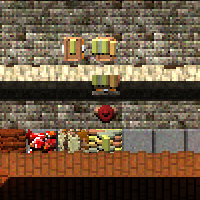Trading: Difference between revisions
No edit summary |
No edit summary |
||
| Line 1: | Line 1: | ||
{{Construction}} | {{Construction}} | ||
[[File:trades_preview.png|right|thumb|200px|A trader collecting fabric from | [[File:trades_preview.png|right|thumb|200px|A trader collecting fabric from an [[export depot]].]]'''Trading''' is the process of giving [[resources]] in order to collect resources, in other words, it's simply bartering with other civilizations. This is very useful in obtaining a resource that is not within reach of your [[settlement]]. In order for trading to work, at least one [[export depot]] and one [[import depot]] must be built. The player can choose which resources are given and received. Resources from the player's settlement must be placed in the export depot, then once a [[trader]] arrives and collects the player's resources from this, they will deliver the chosen resource to the import depot. Much like [[warehouse]]s, resources can be stored in multiples of 128. | ||
Every type of resource has an unfixed value. The rarer and more valuable the resource, the more expensive it will be. Players will receive the amount of resources depending on the value and amount of what they gave. For example, if a player loads 128 units of wood into a trade depot at a value of 15 per unit (which would equal 1920 in total), and the player wanted to receive [[metal]], which for example had a value of 107. This means that once the trader collects all 128 units of wood, the player will receive 17 units of metal from the trader, which would be 1819 in value. This is because the metal units would equal as close to that 1920 without going over.<sup>''[citation needed]''</sup> | Every type of resource has an unfixed value. The rarer and more valuable the resource, the more expensive it will be. Players will receive the amount of resources depending on the value and amount of what they gave. For example, if a player loads 128 units of wood into a trade depot at a value of 15 per unit (which would equal 1920 in total), and the player wanted to receive [[metal]], which for example had a value of 107. This means that once the trader collects all 128 units of wood, the player will receive 17 units of metal from the trader, which would be 1819 in value. This is because the metal units would equal as close to that 1920 without going over.<sup>''[citation needed]''</sup> | ||
[[Category: Gameplay elements]] | [[Category: Gameplay elements]] | ||
Revision as of 16:38, 27 June 2021

Trading is the process of giving resources in order to collect resources, in other words, it's simply bartering with other civilizations. This is very useful in obtaining a resource that is not within reach of your settlement. In order for trading to work, at least one export depot and one import depot must be built. The player can choose which resources are given and received. Resources from the player's settlement must be placed in the export depot, then once a trader arrives and collects the player's resources from this, they will deliver the chosen resource to the import depot. Much like warehouses, resources can be stored in multiples of 128.
Every type of resource has an unfixed value. The rarer and more valuable the resource, the more expensive it will be. Players will receive the amount of resources depending on the value and amount of what they gave. For example, if a player loads 128 units of wood into a trade depot at a value of 15 per unit (which would equal 1920 in total), and the player wanted to receive metal, which for example had a value of 107. This means that once the trader collects all 128 units of wood, the player will receive 17 units of metal from the trader, which would be 1819 in value. This is because the metal units would equal as close to that 1920 without going over.[citation needed]